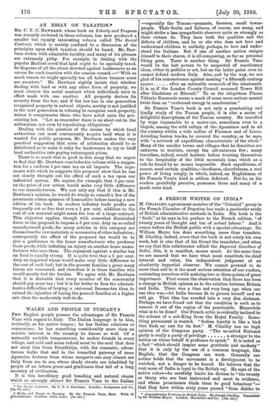AN ESSAY ON TAXATION.*
Ma. C. Y. C. DAWBAB.1{, whose book on Liberty and Progress was recently reviewed in these columns, has now produced a smaller but equally interesting volume called The Social Contract, which is mainly confined to a discussion of the principles upon which taxation should be based. Mr. Daw- barn writes with admirable lucidity, and many of his phrases are extremely pithy. For example, in dealing with the popular Radical creed that land ought to be specially taxed, he disposes of all the abuse directed against landowners as an excuse for such taxation with the concise remark :—" With as much reason we might specially tax all tailors because some are sweaters." Mr. Dawbarn rightly insists that whether dealing with land or with any other form of property, we must observe the social contract which individuals have in effect made with one another. All property derives its security from the law, and if the law has in one generation recognised property in natural objects, society is not justified in the next generation in refusing to recognise such property, unless it compensates those who have acted upon the pre- existing law. " Let us remember there is no short cut to the millennium, not even by repudiating obligations."
Dealing with the question of the means by which local authorities can most conveniently acquire land when it is wanted for public purposes, Mr. Dawbarn makes the very practical suggestion that costs of arbitration should be so distributed as to make it risky for landowners to try to bluff local authorities into paying extravagant prices.
There is so much that is good in this essay that we regret to find that Mr. Dawbarn concludes his volume with a sugges- tion for a uniform 5 per cent. tax on all imports. The argu- ments with which he supports this proposal show that he has not clearly thought out the effect of such a tax upon our industrial system. He argues, for example, that 5 per cent. on the price of raw cotton would make very little difference to our manufacturers. We can only say that if this is Mr. Dawbarn'a opinion, he would do wisely to consult a few of the prominent cotton-spinners of Lancashire before issuing a new edition of his book. In modern industry trade profits are frequently cut so fine that even a 1 per cent. addition to the cost of raw material might mean the loss of a large contract. This objection applies, though with somewhat diminished force, to the proposal to impose a 5 per cent. duty on so-called manufactured goods, for many articles in this category are themselves the raw materials or accessories of other industries ; consequently the effect of the proposed tax would be to give a preference to the home manufacturer who produces these goods, while inflicting an injury on another home manu- facturer who uses them. The argument against a similar tax on food is equally strong. It is quite true that a 5 per cent. duty en imported wheat would make very little difference to the cost of each loaf; but in the poorest families a great many loaves are consumed, and therefore it is these families who would mostly feel the burden. We agree with Mr. Dawbarn that it is desirable that every member of the community should pay some tax ; but it is far better to face the adminis- trative difficulties of levying a universal Income-tax than to extend the injustice of taxing the poorest families at a higher rate than the moderately well-to-do.






































 Previous page
Previous page